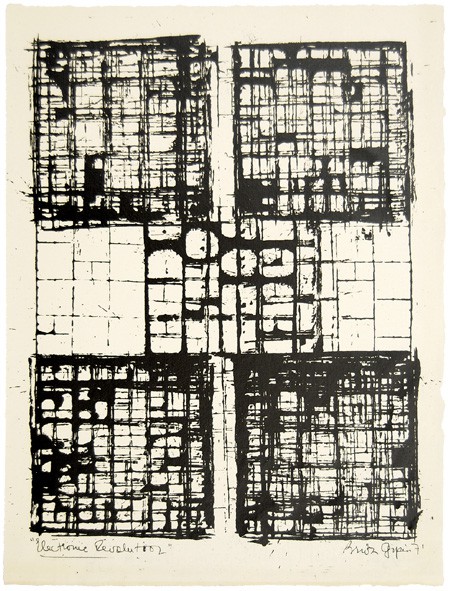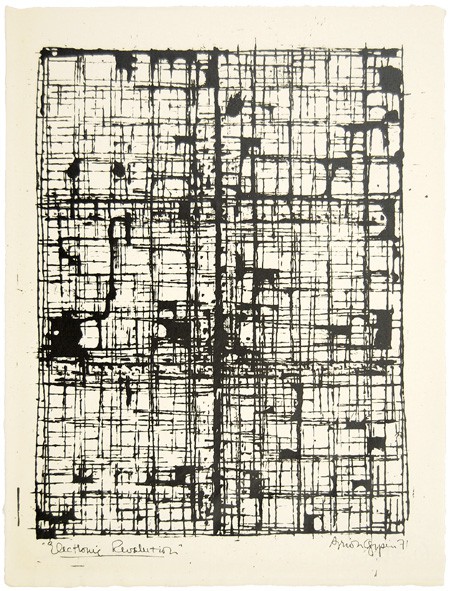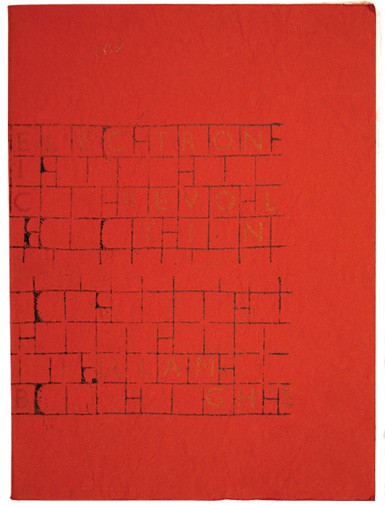A number of
Tape recorders planted in the woods and the village. As many as possible so as to lay
down a grid of sound over the whole festival. Recorders have tapes of prerecorded
material, music, news, broadcasts, recordings from other festivals, etc. At all times
some of the recorders are playing back and some are recording. The recorders
recording the crowd and the other tape recorders that are playing back at varying
distances. This cuts in the crowd who will be hearing their own voices back. Play
back, wind back and record could be electronically controlled with varying intervals.
Or they could be hand operated, the operator deciding what intervals of play back,
record, and wind to use. Effect is greatly increased by a large number of festival
goers with portable recorders playing back and recording as they walk around the
festival.
Back in 1970, William Burroughs wrote an essay called "The Electronic Revolution". In this surprisingly lucid work (at least compared to the rest of his fiction), he contemplates the concept of "tape recorder as weapon". At the most basic level, it can be read as a howto manual on using tape recorders in a crowd... "to create a sense of unease and unrest by playback of random noises cut with random recordings of the crowd itself". Because doing so, means disrupting Control (as popularized in all of Burrough's mythology) by "cutting down the lines of association" that mass media, and spreading of "language virus", depends on.
![]()
While technology people are likely to disregard the rest of his work as abstract nonsense on the ontology of language or random ramblings of an old junkie, The Electronics Revolution is different because it brings the cut-up context to the level we're all comfortable with - as recordings and playbacks on portable tape recorders. Inspired by this piece, a whole new wave of bands such as Cabaret Voltaire started playing around with samples, tape loops and feedback in the early 70ies and the whole thing eventually ended up changing the face of pop culture and creating an explosion in music hardware. As usual, the whole usage of the tape recorder as a mean of cutting-up the reality and fighting Control with technology, never took off.
![]()
So why is this interesting?
Burroughs's essay surfaces the problem of Control (not in the "big brother" sense, but as "nefarious, ill-defined body all the more impossible to spot because the organs of control now control the controllers") and talks about tactical use of consumer electronics as a way to fight it. No matter how bizarre putting the two in the same sentence sounds today, it reflects a sense of empowerment technology once used to give. Tape Recorder. What a device! I can record the passage of time and play it back at will. Burroughs used to describe the man as "the time binding animal" and this is the path that consumer electronics continued to venture, with camcorders, mobile phones... and ultimately, Instagram. Still, it has been a while since I last heard someone trying to challenge our human weakness by using a new Web product. Instead, technology followed the path of Media, optimizing for lowest common denominator and ultimately regressing towards the mean. None of that "bicycles for our minds" stuff anymore.
![]()
But hardware is different. If modern Web products have a natural tendency for becoming "media" (because of network's propensity for connecting people), good-old hardware is still more likely to become a "tool" first and, therefore, still bound to provide some concrete value and novel functionality. Indeed, we see a whole new wave of hardware products coming up - Oculus, Pebble, Nest... all of them delivering innovation and new experiences. As a matter of fact, some of them like FitBit and Pavlok are (ironically) directly after the whole "challenging our human weaknesses" thing, although in a somewhat counter-evolutionary (or perhaps post-evolutionary?) way. Maybe that's a good thing too. All in all, things are looking up.
Still, the question is - what will the whole new "Internet of Things" wave bring? That is where the two worlds collide. It's where tools become media and media becomes tools. Will these products still allow for creative abuse or will they lead to the ultimate self-imposed prison? We all know IoT is about the data, data about every move every single atom in the real world makes. That's why everyone is going crazy about it.
But what happens after we have exploited "instrumenting the real world" to its full potential? If "mass media control" was all about the language, memetics engineering and "laying down the lines of association", this new thing could be about the ultimate manifestation of Control - tyranny of the data. Data that all of us produce and nobody controls. Maybe that's a good thing too. But if it's not - what would be a tool to fight it? Will Cut-up still work in the age of Big Data?
Or maybe we can just build hackable, open-hardware future and won't have to worry about things like this...



 Aleksandar Bradic
Aleksandar Bradic
Discussions
Become a Hackaday.io Member
Create an account to leave a comment. Already have an account? Log In.